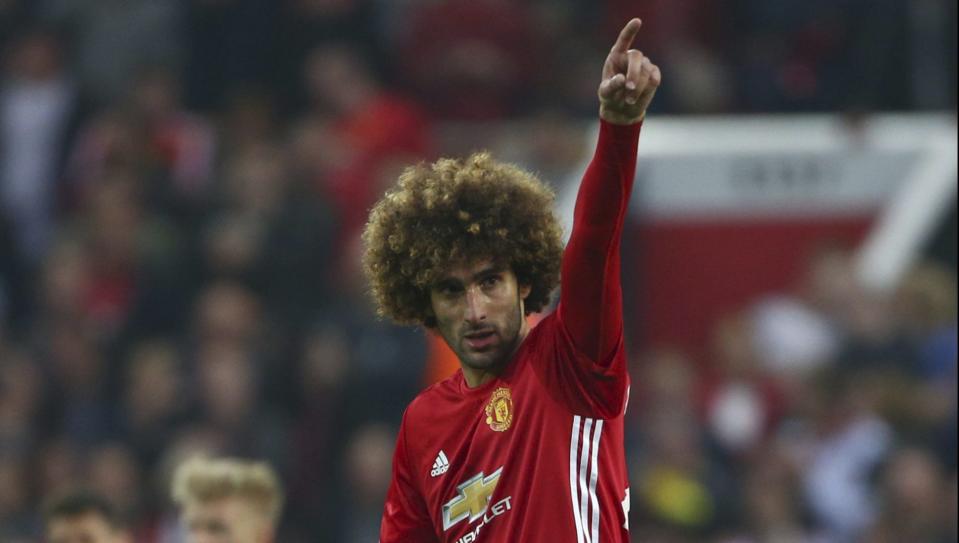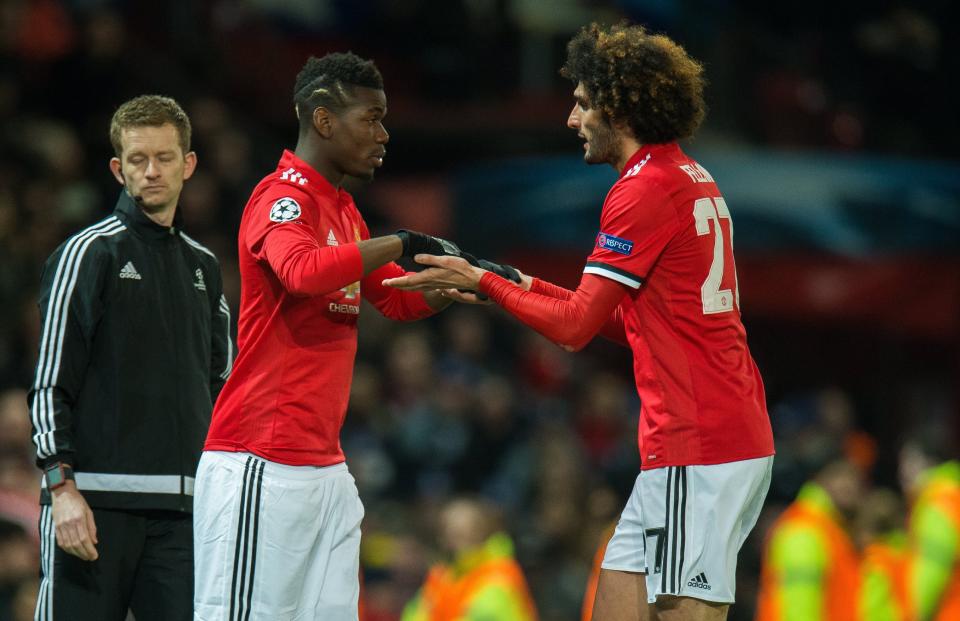Is being Manchester United's ultimate impact sub enough for Belgium man Marouane Fellaini?

It was a swift role reversal, a four-day switch from impact substitute to no-impact starter. Or perhaps that should be wrong impact starter. Whichever, Marouane Fellaini’s week – a crucial cameo against Liverpool, an awful hour against Sevilla – indicated his polarising qualities. It also ought to give an indication of where his future should lie.
The concept of the super-sub is not exactly unknown at Old Trafford. Look at Ole Gunnar Solskjaer and his spiritual successor Javier Hernandez. The Norwegian, in particular, was good enough to start for most sides but was content to be a squad player in a Champions League-winning team. Each could be the razor-sharp replacement who was equally capable of capping a comeback, the penalty-box poacher with the positional awareness to profit in a crowded penalty area.
Now the specialist substitute could become a full-time role; just not in the way it was for the match-winners Solskjaer and Hernandez. They used to give United a lead. On Saturday, Fellaini protected one.
READ MORE: Fellaini – I’m not a thug, I just do my job
READ MORE: Ben Yedder sends dire Man Utd crashing out of Champions League
He came on and the game became Fellainified. It seemed to revolve around the supersized Belgian. With some justification, Jurgen Klopp claimed a penalty when Sadio Mane was caught by Fellaini as both entered the box. Mourinho nonetheless eulogised him for his attitude.
The statistics showed that Fellaini only completed four passes. He nevertheless contrived to exert an influence at either end. He rampaged forward and defended deep. He won headers and free kicks. His chest control, once again, was magnetic. The ball seemed drawn to him as he made a series of clearances and interceptions.
It was another reminder that Fellaini can define a game or, in this instance, the part of it he spends on the pitch. He is immediately identifiable; a match involving him is delineated from others, too. Fellaini can strip his own side of fluency. He can deprive the opposition of it, too. He is a disruptive influence, denying anyone else momentum. He breaks up play, whoever has the ball. He scarcely exists in United’s truest traditions but, like Louis van Gaal before him, Mourinho has come to appreciate Fellaini’s inimitable skillset. Too much, arguably: plunged in for a first start in almost four months against Sevilla, he highlighted his limitations: United were outmanoeuvred in midfield by a technically cleverer side. It showed the ploy of using the long ball was the wrong ball. It should be, at best, Plan B.
United, and Fellaini, hit the false notes. Yet if it felt like the Belgian was running through a greatest-hits package against Liverpool, it could also be a valedictory display of awkward, ungainly physicality. Fellaini is out of contract in the summer. An extended deal has been rejected. Mourinho’s keenness to keep him is not in doubt; Fellaini is tempted to stay but his availability on a free transfer will attract other offers, with talk of a move to Turkey most persistent.
READ MORE: Sevilla’s secret weapon for Man Utd tie
AS IT HAPPENED: Man Utd vs Sevilla
All of which leaves gives him a decision: first-team football elsewhere or the role as the resident 12th man at Old Trafford? Because while he has confounded many a prediction to claim a place in the team before, but it will be harder next season, and not merely because of his stumbles against Sevilla. Nemanja Matic represents the embodiment of Mourinho’s brand of football and his manager’s on-field voice.
Scott McTominay feels the coming force and the manager’s new favourite. Paul Pogba remains an £89 million signing of enviable talent, albeit an enigma, so he will not be discarded. With Michael Carrick retiring, a midfielder will be a priority in the transfer market and an expensive acquisition will presumably be pencilled in for a starting berth. Ander Herrera, last season’s winner of the Sir Matt Busby award, will presumably still be around. Six into two or three will not go.

But Fellaini will fit into any 18. If Solskjaer and Hernandez were one type of super-sub, Fellaini has the potential to be all. He can help United chase a game or look after a lead. Mourinho can send him on in any situation. Two of his four goals this season have been a substitute. His prowess as a suddenly-summoned target man produced the knockdown for Marcus Rashford’s Europa League quarter-final winner against Anderlecht last season. He can bring chaos in the opposition’s penalty box.
READ MORE: Why Ronaldo wants Lewandowski signing
READ MORE: Mourinho picks worst ever Premier League boss
But that defensive option, to add height at set-pieces, to turn a midfield duo into a trio, to unsettle opponents by bounding around eagerly and break up play by getting in the way of anything or anyone: it all makes Fellaini a different type of substitute, a kind Mourinho can value.
When he was out injured, a manager with a long-standing fondness for a back four took to sending on a third centre-back when he felt opponents would launch a late aerial attack. Fellaini’s height can negate the need for that. He will never be a purists’ player but he has won many a pragmatist over with his usefulness in a variety of situations. He has been much maligned but his multifunctional nature could make him impossible to ignore when selecting the substitutes. Which leaves it up to Fellaini: is being the indispensable, irreplaceable impact substitute at one of the world’s biggest clubs enough for him?

 Yahoo Sport
Yahoo Sport 






































